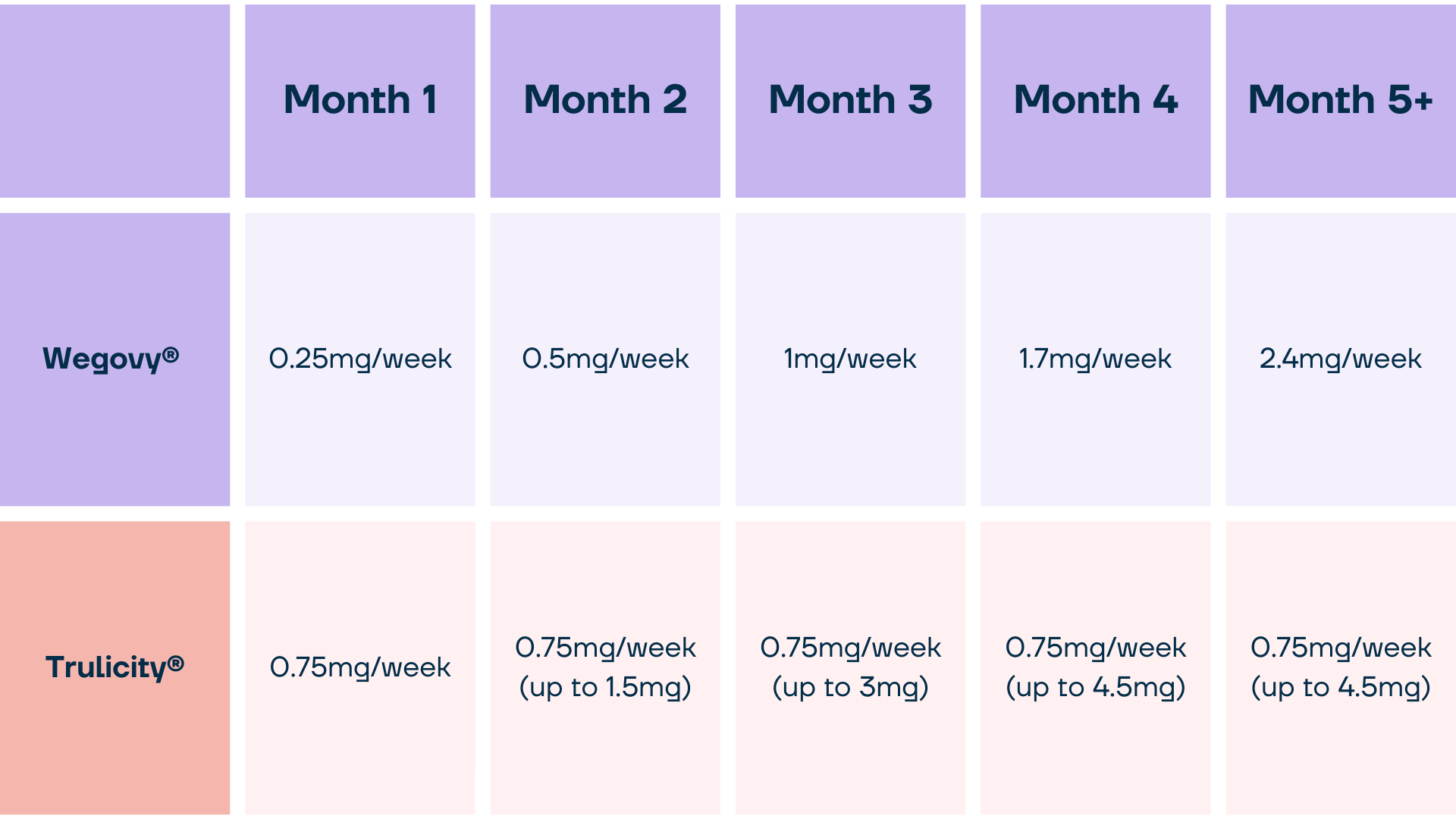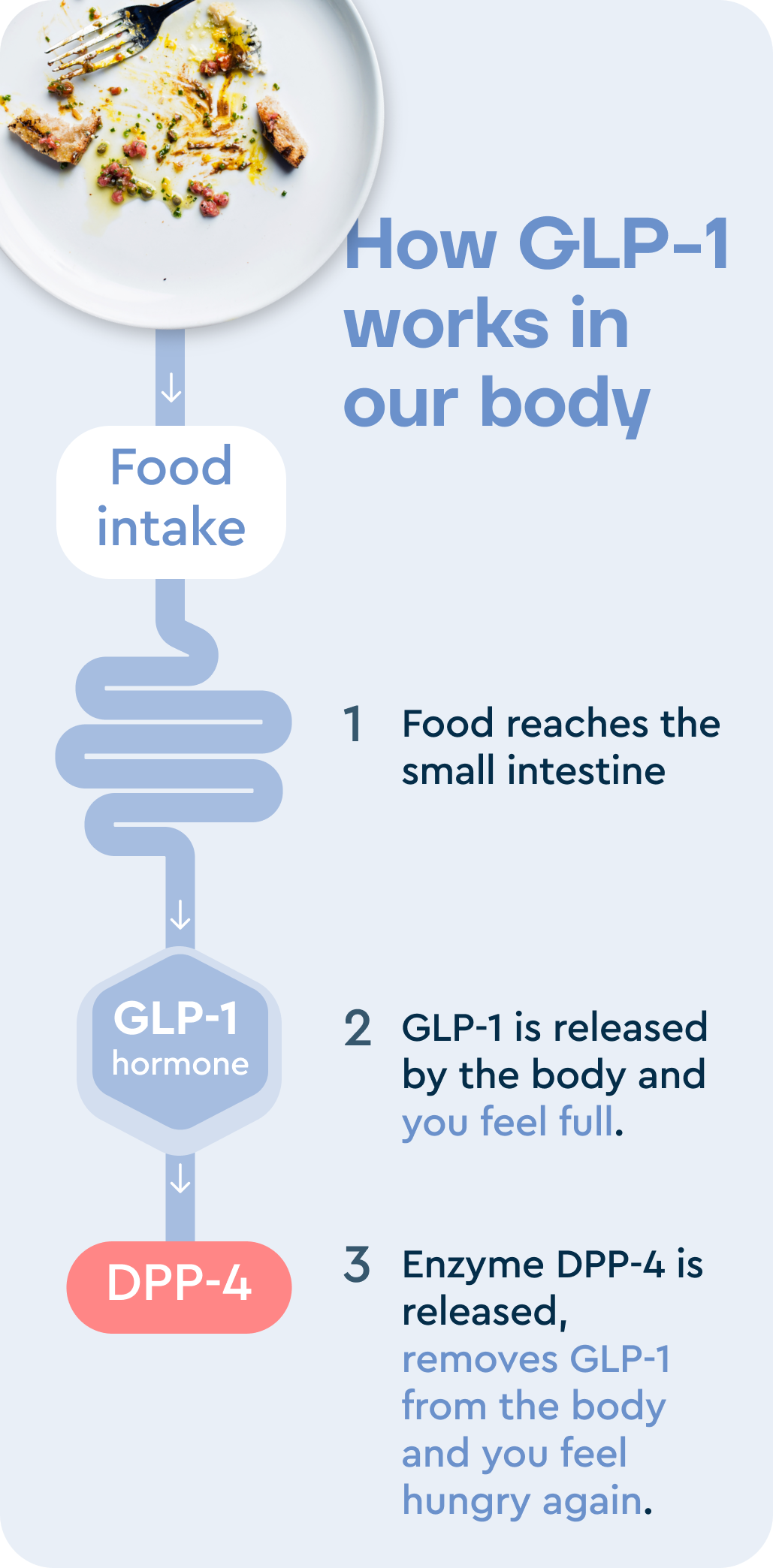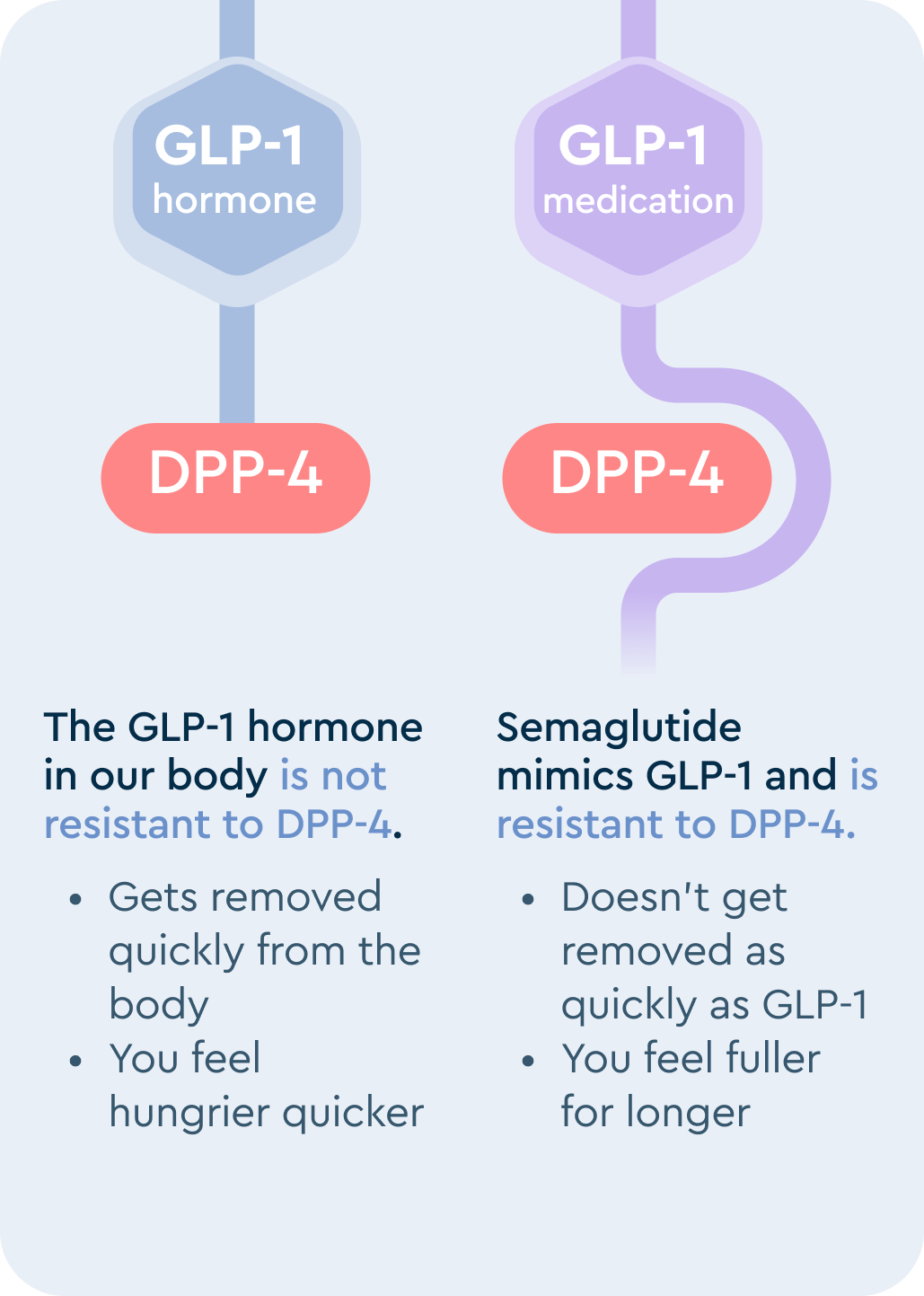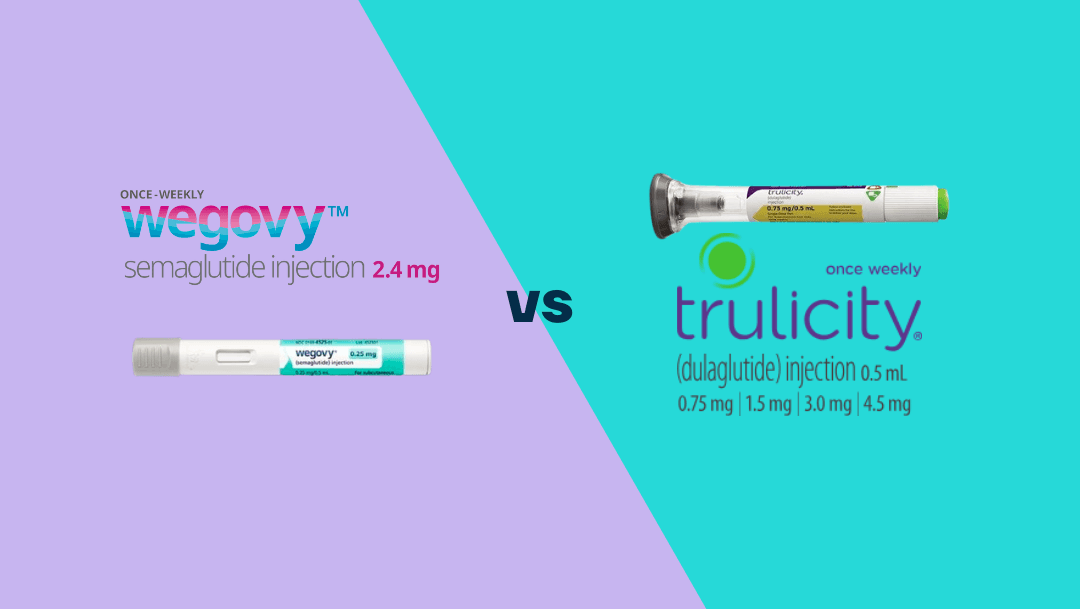Jump to: How do Wegovy and Trulicity work? | Wegovy vs Trulicity: Which is better for weight loss? | Wegovy vs Trulicity: Which is better? | Take home message
Wegovy (semaglutide) and Trulicity (duaglutide) are medications used for the treatment of obesity and type 2 diabetes. Both drugs are injected once per week.
When directly comparing, studies show that Wegovy is more effective than Trulicity for weight loss and improving blood sugar control.
So, if you’re looking for a medication to help you lose weight and improve your blood sugar levels, research suggests Wegovy may lead to more weight loss and blood sugar reductions.
However, individual responses to medications vary. Be mindful of side effects and contact your healthcare team to determine the appropriate medication and dosage.
What are Wegovy and Trulicity?
Wegovy is a medication approved for the treatment of obesity in the UK; it can also be prescribed to individuals living with obesity and type 2 diabetes.
Trulicity is a medication approved for the treatment of type 2 diabetes. However, Trulicity may be prescribed for weight loss in the UK.
However, the UK government has recently urged clinics to stop prescribing Trulicity for weight loss after shortages impacted the supply for people living with type 2 diabetes.
Wegovy and Trulicity are GLP-1 receptor agonists, medications that reduce appetite to support weight loss and improve blood glucose control through various mechanisms.
Wegovy is manufactured by Novo Nordisk, and Trulicity by Eli Lilly. The active ingredient in Wegovy is semaglutide, and dulaglutide in Trulicity.
Wegovy and Trulicity are available via prescription, although their eligibility criteria differ, which we’ll cover in a section below.
Both medications have similar dosing schedules and are administered once a week. The main difference is the amount of medication used, with Trulicity rising to 4.5mg if necessary and Wegovy up to 2.4mg.
Wegovy and Trulicity dosing schedules:

Not a magic pill
Weight-loss injections are designed as additional tools for healthy lifestyle change and shouldn’t be considered as lifelong medications.
Instead, they should be used to help you kickstart your weight-loss journey whilst you focus on building new, healthy habits.
Consider the use of antidepressants for people living with depression. They’re not designed to cure the condition. Instead, they’re designed to allow room for therapy to treat the condition’s underlying cause.
Mounjaro and Wegovy are similar. These medications can help silence food-related thoughts and also give you a boost of confidence with more immediate weight-loss results.
This helps to buy you the time and headspace to understand why your body may have struggled to lose weight previously, and to build new long-term healthy habits.
The core focus of our medication programmes are to calm down the feeling of food noise, lower your cravings, and to allow you to build healthier habits to keep the weight off for good.
The ultimate goal is to make losing weight feel second nature.
Second Nature’s medication programme
Second Nature currently provides Mounjaro as part of our Mounjaro weight-loss programme.
Why should you choose Second Nature over other medication providers if you’ve decided to try Mounjaro (assuming you’re eligible)?
For peace of mind.
Second Nature has worked with the NHS for over 6 years providing weight-loss programmes across the UK.
While our Mounjaro weight-loss programme is private and not currently used by the NHS, we’ve built the programmes focusing on scientific evidence, patient safety, and data security.
We hope that our 6+ years of working with the NHS and building a track record of effective weight-loss results will give you peace of mind to give us a try.
Otherwise, keep reading as we examine the science of Wegovy and Trulicity.
1) How do Wegovy and Trulicity work?
When we eat food, our gut releases hormones that help the body regulate hunger and blood sugar levels.
GLP-1 (glucagon-like peptide-1) is one of these hormones and improves insulin function to lower blood sugar levels and delays gastric emptying, decreasing appetite.
GLP-1s also communicate with the brain’s appetite control centre, the hypothalamus, to lower hunger and food-seeking behaviour.

Trulicity and Wegovy mimic the actions of the hormone GLP-1 and are known as GLP-1 receptor agonists or GLP-1s.
They are effective because they remain in the bloodstream for longer than the hormone GLP-1. When GLP-1 is released from the gut, only 25% makes it into the bloodstream and is rapidly removed from the system.
It’s removed from our body by an enzyme called DPP-4. GLP-1s like Wegovy are resistant to DPP-4, and their levels remain elevated in the bloodstream for 4-7 days.

After 4-5 weeks on Wegovy, the body reaches a steady state where its level remains consistent in the bloodstream rather than rising and falling.
Key points:
- GLP-1 receptor agonists (GLP-1s) are a class of medications that mimic the actions of the hormone GLP-1, which helps regulate hunger and blood sugar levels
- GLP-1s help the pancreas release more insulin, delay stomach emptying, and reduce appetite
- Wegovy and Trulicity mimic the action of GLP-1 and decrease appetite and blood sugar levels
2 – Wegovy vs Trulicity: Which is better for weight loss?
Wegovy (semaglutide) generally leads to more significant weight loss than Trulicity (dulaglutide).
However, it’s worth noting that Trulicity isn’t approved for weight loss in the UK and is only approved for people living with type 2 diabetes.
Randomised controlled trials have shown that Wegovy can lead to an average weight loss of around 16% after one year. If you weighed 100kg, that would be a weight loss of 16kg.
In comparison, research has shown that dulaglutide leads to weight loss of around 4-5% of body weight after one year. If you weighed 100kg, that would be a weight loss of 4-5kg.
So, research suggests that Wegovy leads to around 10% more weight loss than Trulicity after one year.
Wegovy vs. Trulicity: Which is better for HbA1c?
Research has shown that Wegovy typically supports an HbA1c reduction of 1.8 percentage points, compared to 1.4 with Trulicity.
1.8 percentage points of HbA1c is equivalent to a reduction of around 20mmol/mol, compared to 1.4 which is around 15mmol/mol.
So, Wegovy and Trulicity lead to significant blood sugar reductions, with Wegovy performing slightly better than Trulicity.
Key points:
- Wegovy leads to more significant reductions in weight and blood sugar than Trulicity
- However, Trulicity isn’t approved as a weight loss medication in the UK
3) Wegovy vs Trulicity: Which is better?
Effectiveness
Wegovy is generally a more effective drug than Trulicity. As demonstrated above, semaglutide (the active ingredient in Wegovy) leads to more clinically significant weight loss and blood sugar reductions than dulaglutide (the active ingredient in Trulicity).
If you were looking at trying GLP-1 medications for weight loss or blood sugar improvements, Wegovy would likely be the better choice.
However, everyone responds to medications differently, and you may adhere to one or the other better depending on how you feel while taking the medication.
Side effects and safety
All medications have possible side effects, particularly if you live with other health conditions.
Some will be mild but uncomfortable, such as cramping, and others will be more severe, such as shortness of breath. You must report any side effects you experience to your doctor and healthcare team when on medications.
Trulicity and Wegovy appear to have similar safety profiles. Both medications lead to minor side effects such as nausea, constipation, and diarrhoea.
However, research suggests slightly more people discontinue Wegovy than Trulicity due to adverse events, with around 13% of patients stopping Wegovy because of adverse events, compared to around 9% on Trulicity.
Further supporting this, real-world data from a U.S. clinical practice on patients living with type 2 diabetes suggests that more people adhere to dulaglutide than semaglutide.
After six months, 63.4% of patients prescribed dulaglutide were still taking the medication, compared to 47.8% on semaglutide. At 12 months, it was 54.4% for dulaglutide and 43.3% for semaglutide.
However, type 2 diabetes is a complex condition, and adhering to medication can be challenging when other complications of the condition arise. So, these results may not translate to those not living with type 2 diabetes.
Cost
Wegovy
To get Wegovy and the injectable pens required for four weeks of treatment will cost £229 for the lower doses, rising to £299 for the higher doses with Second Nature.
Getting Wegovy on prescription through the NHS will only cost you the prescription fee of £9.95 in England.
Trulicity
The cost depends on where you’re purchasing it from and how long you intend to use the medication. However, to purchase the medication and injectable pens required for four weeks would cost around £126, or around £1520 per year.
Second Nature doesn’t provide Trulicity as part of our medication-supported programme.
Getting Trulicity on prescription through the NHS will only cost you the prescription fee of £9.95 in England.
Key points:
- Wegovy is generally a more effective than Trulicity at supporting weight loss and blood sugar reductions
- The safety profile of Wegovy and Trulicity is fairly similar and both medications lead to common GI side effects like nausea. But research suggests that people living with type 2 diabetes may adhere to dulaglutide better than semaglutide.
- However, individuals will vary in their medication response, so choose the right one for you
- Wegovy and Trulicity are both available in the UK on prescription
Take home message
The recent innovations in GLP-1 medications are pretty remarkable and have caused quite a stir in the world of healthcare.
We’re in new territory where obesity and type 2 diabetes medications treat an underlying cause instead of merely treating the symptoms to support better management.
However, these drugs shouldn’t be seen as miracle cures; they’re not designed to be used for life.
They’ve been designed to be taken alongside lifestyle changes that will enable you to eventually come off the medications and maintain your lower weight for the long term.
GLP-1s are safe and effective for most people in the short to medium term, but we don’t have long-term data to be sure they’re not causing severe adverse effects elsewhere.
At Second Nature, we’re not against using medications to support people in making healthy changes and reducing their risk of chronic disease.
However, we don’t recommend using medications as a reason not to make healthy lifestyle changes. The causes of obesity and type 2 diabetes aren’t merely rooted in biology but also psychology and sociology.
With these medications, you may lose weight and reduce blood sugar levels. But will you be happier? Will you be more fulfilled? Will you be content with your life and social relationships?
For that, you may need to consider a lifestyle change.







